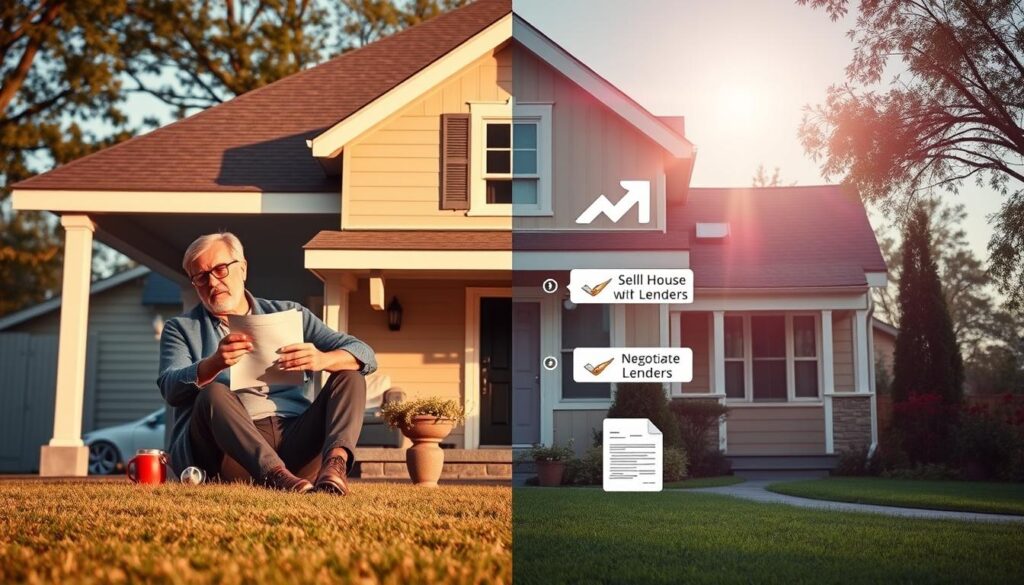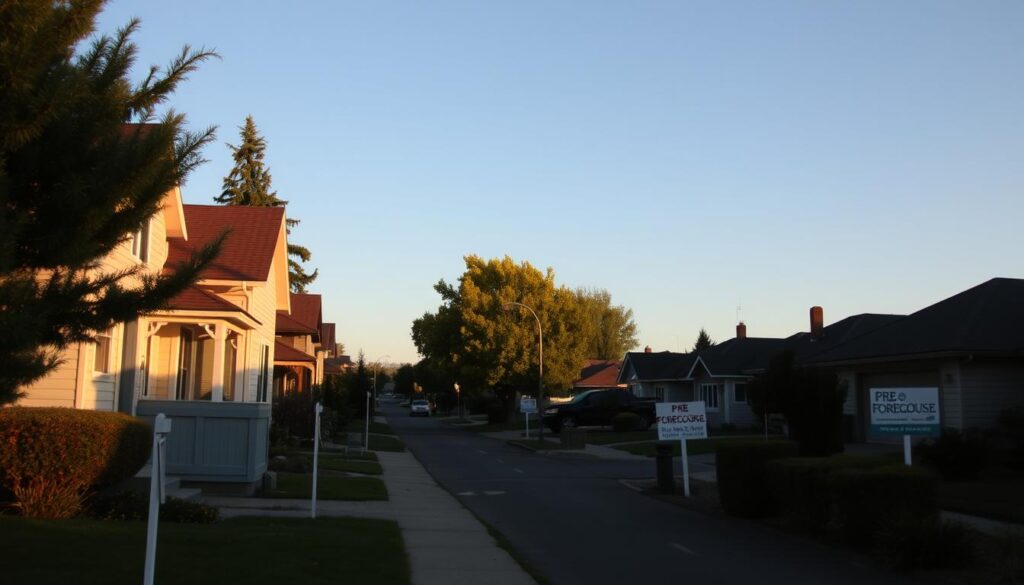Have you ever wondered what happens when homeowners face the risk of losing their home? Many think foreclosure is the end, but pre foreclosure offers a chance to turn things around. Knowing your options in this phase can greatly affect your financial future and how you manage your property.
When homeowners are 90 days late on their mortgage, they enter pre foreclosure. This starts a legal process that can last months or even years. After three missed payments, a notice of default is sent, urging homeowners to look into help like loan modifications, repayment plans, and short sales.
This article will explore key pre foreclosure options for homeowners and investors. By learning about the pre foreclosure process, you can make smart choices that protect your finances and prevent foreclosure. For more on pre foreclosure versus foreclosure, see this resource.
Key Takeaways
- Homeowners enter pre foreclosure after three missed mortgage payments.
- A notice of default initiates the legal process and signifies the start of pre foreclosure.
- Options for homeowners in pre foreclosure include loan modifications, short sales, and forbearance.
- Pre foreclosure properties can be priced below market value, attracting buyers.
- Seeking assistance from certified housing counselors is essential in this phase.
- Investors can benefit from identifying pre foreclosure homes not yet listed for sale.
- Understanding pre foreclosure can aid homeowners in avoiding the stigma of foreclosure and protect their credit.
What is Pre Foreclosure?
Pre foreclosure is a critical stage before a home is foreclosed. It happens when a homeowner misses mortgage payments. Lenders then file a Notice of Default, starting legal steps that could lead to foreclosure if not fixed.
Definition and Overview
The pre foreclosure stage warns that a homeowner might lose their home due to unpaid mortgage. It usually starts when a homeowner is 90 days late on payments, after missing three in a row. Knowing about this stage is key for homeowners looking for foreclosure help during tough times.
Legal Process and Timeline
When a homeowner is 90 days late, lenders start the foreclosure legal process. They file a Notice of Default, a formal notice of default status. In California, lenders must give homeowners 30 days to find ways to avoid foreclosure before filing the NOD. The pre foreclosure timeline varies based on state laws and lender practices.
Importance of the Notice of Default
The Notice of Default is crucial in the pre foreclosure process. It warns homeowners and records their default status. It shows how much is owed and what needs to be done financially. Homeowners must act quickly to a Notice of Default to negotiate or find other ways to avoid foreclosure. They should seek help to understand their options.
The Pre Foreclosure Process
The pre foreclosure process is a critical time for homeowners who have fallen behind on their mortgage payments. It starts when a homeowner misses payments. This can trigger a series of notifications about the unpaid debt.
Steps Involved in Pre Foreclosure
First, borrowers may get a call from their lender after missing a payment. There’s usually a grace period until the 15th of the month to make the payment. If the second payment is missed, the lender may follow up by phone.
- After three months of missed payments, a demand letter is issued by the lender, outlining the total delinquency.
- The Notice of Default (NOD) is filed once the borrower is 90 days past due, indicating formal proceedings have started.
- Homeowners have a 30-day window to remedy overdue payments before the formal foreclosure process moves forward.
Notices and Documentation Needed
A variety of documentation is crucial during the pre foreclosure process. The NOD must be filed publicly and serves as a pivotal notice for all involved parties. Additional notices may follow, informing homeowners of impending foreclosure auctions.
Homeowners must prepare essential documentation for negotiations. This may include:
- Proof of income
- Bank statements
- Budget plans
This documentation not only aids in negotiations with lenders but also provides essential insights into the homeowner’s financial situation. Understanding these elements is vital for anyone facing the pre foreclosure process.
Available Options During Pre Foreclosure
Homeowners in pre foreclosure have several options to avoid foreclosure. It’s important to understand these paths. Keeping in touch with your lender can lead to better solutions.
Communication with Your Lender
Talking to your lender is the first step in solving financial problems. Keeping a regular communication with lender is key. Many lenders are ready to help. By reaching out, you can explore pre foreclosure options and show you’re proactive.
Loan Modifications and Repayment Plans
Loan modifications can help. You can ask for changes in your loan terms. This might mean longer to pay or lower interest rates. It can make your monthly payments more manageable. Starting this process early can make it easier to get back on track.
Forbearance and Its Implications
A forbearance agreement lets you pause mortgage payments temporarily. While it helps short-term, it’s crucial to know its long-term effects. Missed payments will be due all at once after the forbearance ends. You’ll need to plan carefully to avoid more problems.
Short Sales and Deed In Lieu of Foreclosure
Considering a short sale might be good if you can’t keep up with your mortgage. It involves selling your home for less than what you owe, with the lender’s okay. Or, you could choose a deed in lieu of foreclosure. This lets you give your home to the lender to avoid foreclosure. Both options need careful thought and understanding of their financial impact.

| Options | Description | Pros | Cons |
|---|---|---|---|
| Communication with Lender | Engaging the lender to discuss payment options. | Potential for customized solutions. | Requires willingness and cooperation from both parties. |
| Loan Modifications | Changes to loan terms to make payments manageable. | Lower monthly payments can ease financial strain. | May involve a lengthy approval process. |
| Forbearance | Temporary pause on payments. | Immediate relief from financial burden. | Missed payments must be repaid in full later. |
| Short Sales | Selling the home for less than owed with lender approval. | Can prevent lengthy foreclosure processes. | Impact on credit score and requires lender consent. |
| Deed in Lieu of Foreclosure | Transfer ownership of home to lender. | Quick resolution to avoid foreclosure. | Severe impact on credit and potential tax implications. |
For more information on pre foreclosure, check out this resource.
Buying Pre Foreclosures: A Real Estate Opportunity
Buying pre foreclosures is a special chance for those looking for good deals in real estate. These properties often have great benefits, but you need to think carefully. Knowing the benefits for buyers and the risks can help you make a smart choice.
Benefits for Buyers
Many investors find great deals on pre foreclosures. Here are the main benefits:
- Properties often sell for less than market value because the owner wants to avoid foreclosure.
- The buying process is faster, with fewer steps than traditional foreclosures.
- There are more financing options, allowing for mortgage purchases instead of all cash.
- There’s less competition, making it easier to get good deals.
What to Consider Before Purchasing
While the real estate opportunity is tempting, careful evaluation is key. Consider these points:
- Check the property’s condition, as many pre foreclosures need a lot of repairs.
- Look into any liens on the property to make sure all debts are paid before buying.
- Work with a skilled real estate agent to help with the complex process.
- Do thorough inspections and get a clear title to avoid legal problems.
Potential Risks Involved
Buying pre foreclosures comes with its own set of challenges. Key risks include:
- Unexpected repairs can add extra costs.
- The property’s financial history might affect its value or create surprises.
- Closing delays can mess up your plans for moving in.
- Changes in the homeowner’s finances could affect the deal or need renegotiation.

Pre Foreclosure Prevention Strategies
Being a homeowner means you have big responsibilities, like making mortgage payments on time. If you’re facing pre foreclosure, there are steps you can take. By focusing on prevention, you might be able to keep your home.
Proactive Communication with Your Lender
Starting early communication with your lender can really help. Talking about problems before you fall behind can lead to solutions. This way, you build trust and get better help from your lender.
Seeking Housing Counseling Assistance
Getting help from housing counseling assistance is wise when you’re struggling. HUD-approved agencies offer great support. They help you understand your options and make smart choices.
Defining a Financial Recovery Plan
Creating a financial recovery plan is key to getting back on track. This might mean cutting expenses or finding new income sources. With a solid plan, you can face your financial challenges head-on.
| Strategy | Description | Benefits |
|---|---|---|
| Communication with Lender | Contacting your mortgage lender to discuss options and prevent further escalation. | Establishes trust; may lead to flexible solutions. |
| Housing Counseling Assistance | Engaging with HUD-approved agencies for expert guidance and resources. | Access to information on available programs; personalized support. |
| Financial Recovery Plan | Developing a tailored strategy to manage finances and reduce stress. | Helps maintain financial stability; fosters planning for future payments. |
Conclusion
Going through the pre foreclosure phase can be tough for homeowners. But, knowing your options and resources can help a lot. Talking to lenders, looking into short sales, or getting help from housing counselors can make a big difference.
Homeowners usually have three months to pay off their debt or sell their home. This makes acting fast very important.
For investors, the pre foreclosure market is a chance to find good deals. Properties might be cheaper than their worth. But, it’s crucial to check the property’s condition and any debts it has.
Building trust with homeowners in trouble is also key. It helps reduce risks and can lead to better investments.
In short, whether you’re a homeowner looking for help or an investor looking for deals, being informed and proactive is essential. Using the right resources and advice can help you get through the pre foreclosure phase successfully.






